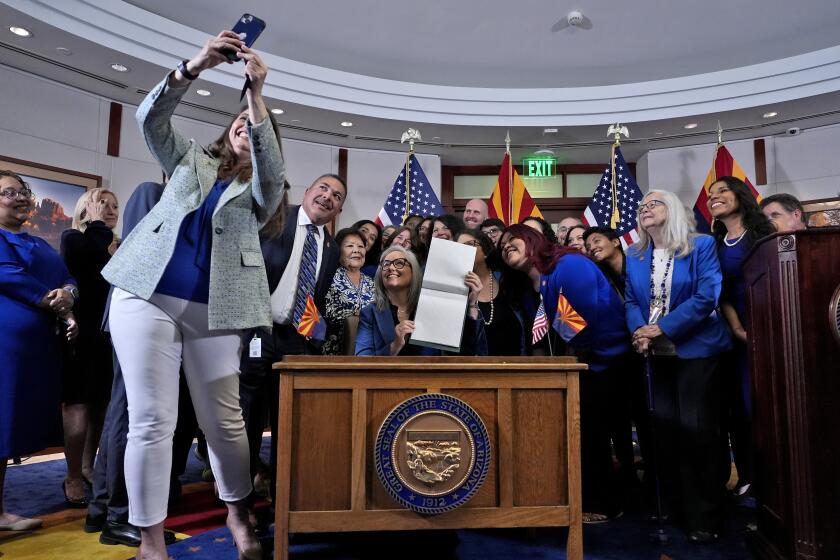Drug Firms Say Secrecy Fostered Credibility ‘Crisis’
Pharmaceutical company officials admitted Thursday that the public’s confidence has been eroded by the controversy over the firms’ failure to publish unfavorable results from clinical trials of the safety and effectiveness of antidepressants for children.
They said they hoped that their recent commitments, individually and collectively, to make data from clinical trials of these and other drugs available would help restore the public’s trust.
“We believe there is clearly a societal crisis in terms of credibility for drug companies,” Dr. John R. Hayes of Eli Lilly & Co. told the House Energy and Commerce Committee.
Pharmaceutical Research and Manufacturers of America, a trade association representing most drug companies, announced Tuesday that as of Oct. 1, it would have a website -- www.clinicalstudyresults.org -- with access to all study results since October 2002 for drugs marketed in the United States.
Joseph S. Camardo, a senior vice president of Wyeth Research, told reporters during a break in the hearing that the media and congressional outcry over the link between antidepressants and suicide, along with the failure of drug companies to disclose results of their drug trials, “brought the issue to everyone’s attention.”
During the hearing before the House Energy and Commerce subcommittee on oversight and investigations, members of Congress also assailed the drug companies and the Food and Drug Administration for failing to provide doctors and parents with the information they needed to decide whether antidepressants would help or harm children.
Fluoxetine hydrochloride, marketed as Prozac, is the only antidepressant approved by the FDA for children. But four other antidepressants were prescribed more frequently to children 17 and younger between 1998 and 2002 -- sertraline hydrochloride (Zoloft), paroxetine hydrochloride (Paxil), bupropion hydrochloride (Wellbutrin) and citalopram hydrobromide (Celexa), according to the FDA.
Twelve of 15 studies of popular antidepressants known as selective serotonin reuptake inhibitors failed to show that the drugs were effective in children.
When the committee began its investigation this year, only three of those studies had been published, according to the committee. Several have been made public since.
An internal FDA study and a study done by Columbia University at the FDA’s request both concluded that, according to the drug companies’ own trials, children were almost twice as likely to have suicidal thoughts or behavior if they took the drugs than if they took placebos.
Committee members criticized the FDA for failing to cooperate with their investigation.
Rep. Joe Barton (R-Texas) read an e-mail from an FDA official directing his colleagues not to provide Congress with “draft documents, notes, memos to self or file or incoming contacts from non-FDA individuals.”
He accused the FDA of “stonewalling, slow rolling and plain incompetency.”
But Dr. Janet Woodcock, FDA’s deputy commissioner for operations, defended the agency, saying, “We have legal restrictions of the kind of information we can disclose.”
Several committee members criticized the FDA for telling one of the companies, Wyeth, to remove information from the label of its antidepressant Effexor warning that, in clinical studies, patients 6 to 17 showed increased reports of suicidal behavior and hostility.
Instead, the FDA told the company to include a more general warning, issued in March for 10 antidepressants, stating that such drugs can cause deepening depression or even suicide.
Members of Congress said the FDA’s actions had led parents to believe that these drugs could help depressed children.
“These parents are frantic,” said Rep. Diana DeGette (D-Colo.) “Their children are depressed and they are under the illusion that these drugs will work.”
Woodstock said the FDA had not acted more aggressively to limit the use of these drugs in children because there were so few options to treat depression in that age group. In addition, she said, the agency believes that “the jury is still out” on determining the effectiveness of these drugs in children. Suicide, the third leading cause of death in children 15 to 19, claims the lives of thousands of young people each year. Depression is a significant cause of suicide.
An FDA advisory committee plans to consider further regulatory options at a meeting next week.
More to Read
Get the L.A. Times Politics newsletter
Deeply reported insights into legislation, politics and policy from Sacramento, Washington and beyond. In your inbox three times per week.
You may occasionally receive promotional content from the Los Angeles Times.










